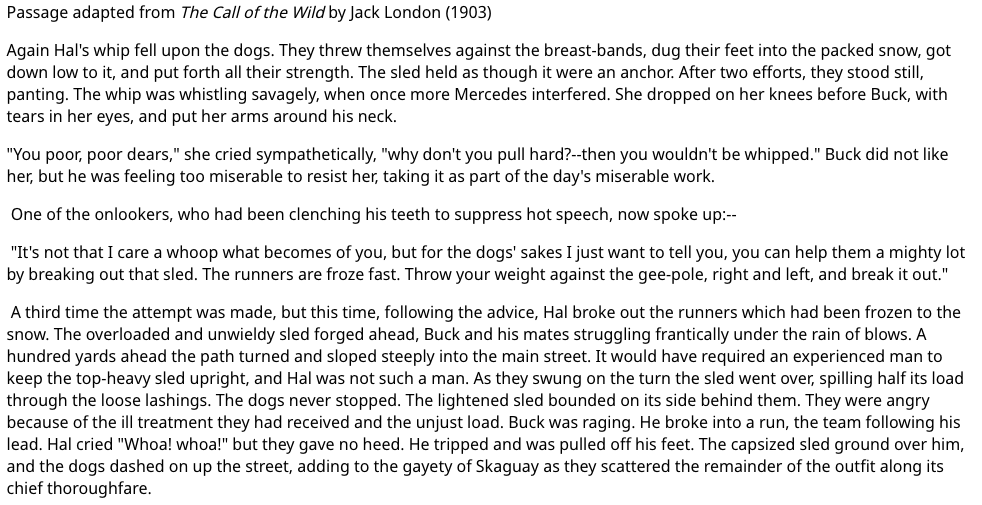FREE ELPT Reading Comprehension Questions and Answers
In Sentence 5, to what does “frippery” refer?

Explanation:
While Sentences 3 and 4 digress somewhat from the main topic of Sentences 1 and 2 (Miss Brooke's style of clothing), Sentence 5 returns to the subject. Sentence 5 also notes that middle-class, respectable women such as the Brooke sisters regard this
"frippery" as beneath their social position. Thus, it stands to reason that the "frippery" in question is foolishly ornate clothing.
In Sentence 1, what does “thrown into relief” mean?

Explanation:
Sentence 2 elaborates upon the idea introduced in Sentence 1. Miss Brooke's physical beauty is so great that plain, "bare," or
"poor" clothes only serve to underscore or emphasis it. None of the other words make sense when substituted into the passage.
In Sentence 4, what action is suggested by the phrase “if you inquired backward for a generation or two”?

Explanation:
"Inquiring backward a generation or two" is a quaint way of suggesting genealogical research. There is nothing in this passage to indicate that the townspeople or elders can provide information about the Brookes' heritage, nor is there anything to suggest that the evidence uncovered would be damning. The author simply means that, if someone were to consult a genealogical record that extended several generations into the past, they would discover more information about the Brookes' ancestors.
To what does “mixed conditions” (Sentence 3) refer?

Explanation:
The paragraph in which "mixed conditions" appears discusses the Brooke sisters' social status. It mentions their ancestors, their "respectable family estate" (Sentence 4), and their "birth," or family's social position. Thus, the "mixed conditions" denote the women's good family name but modest income.
Based on the passage, it can be inferred that “Cromwell” was a ______________.

Explanation:
The reference to Cromwell appears in Sentence 4 and denotes a historical man, Oliver Cromwell, who was a 17th-century leader of England before being overthrown. Although it's tempting to choose the "religious leader" option because the Brookes' ancestor is described as "a Puritan gentleman," read more closely. This same ancestor, after serving under Cromwell and then "conforming" or reversing his opinions back to the political majority, "managed to come out of all political troubles," not religious troubles.
What is the author indicating with the phrase “yard-measuring or parcel-tying forefathers” (Sentence 4)?

Explanation:
Sentence 4 goes on to elaborate upon this curious phrase: "yard-measuring or parcel-tying forefathers — anything lower than an admiral or a clergyman." Thus we can see that "admiral and clergyman," both fairly respected positions, is in contrast to "yard-measuring or parcel-tying forefathers." The only choice that makes sense in this context is working-class men ("farmers" is too specific).
Based on the passage, it can be inferred that __________________.

Explanation:
The phrase "adding to the gayety of Skaguay" at the end of the passage implies that the onlookers felt that Hal was being punished for his earlier mistreatment of the dogs.
Advertisement
Based on the passage, it can be inferred that ________________.

Explanation:
The lines "taking it as part of the day's miserable work" and "they were angry because of the ill-treatment they had received" indicate that the dogs had been mistreated in the past.
What is the role of Sentence 1 in relation to the rest of the passage?

Explanation:
Sentence 1 describes bluntly the type of person who Miss Dwarris is. The rest of the passage is devoted to fleshing out that description, adding details to support the author's assertions: she "had been a sore trial to her relations" all her life.
In Sentence 2, what is the meaning of “a woman of means”?

Explanation:
While elsewhere in the passage there is evidence of Miss Dwarris' cruelty, the phrase in question concerns her financial status. Even if you weren't familiar with the term "person of means" as a euphemism for "wealthy person," you could note the contrast in Sentence 2 between this euphemism and the "impecunious" or impoverished cousins.
In Sentence 2, what rhetorical device does “scorpions of Rehoboam” represent?

Explanation:
An allusion is a reference to another literary (or sometimes historical, artistic, etc.) thing, place, or event (e.g. the title of the novel Brave New World alludes to the lines "O brave new world, / That has such people in 't!" in Shakespeare's The Tempest). Alliteration is the repetition of similar sounds at the beginning of multiple words (e.g. "two torn tulips"). A simile is a comparison using "like" or "as" (e.g. "the still pond is like a looking glass"). Metonymy is the substitution of one word for another word that's commonly associated with it (e.g. using "throne" to discuss a monarchy).
Parallelism is the use of clauses with identical grammatical patterns, syntax, or meter (e.g. ""She expected nothing, hoped for everything, and received something"").